Soundproof fence (do they work? 7 things before you buy)
What is a soundproof fence and how does it work?
A soundproof fence is a kind of acoustic barrier, that prevents noise from being transferred. They are perfect for soundproofing gardens in residential areas to help create a quiet, peaceful outdoor space at your home.
But how do soundproof fences work? Soundproof fences require high mass and tight seals to create an effective solution to noisy gardens. The diagrams below show how soundproof fences work and why traditional timber fence are ineffective.
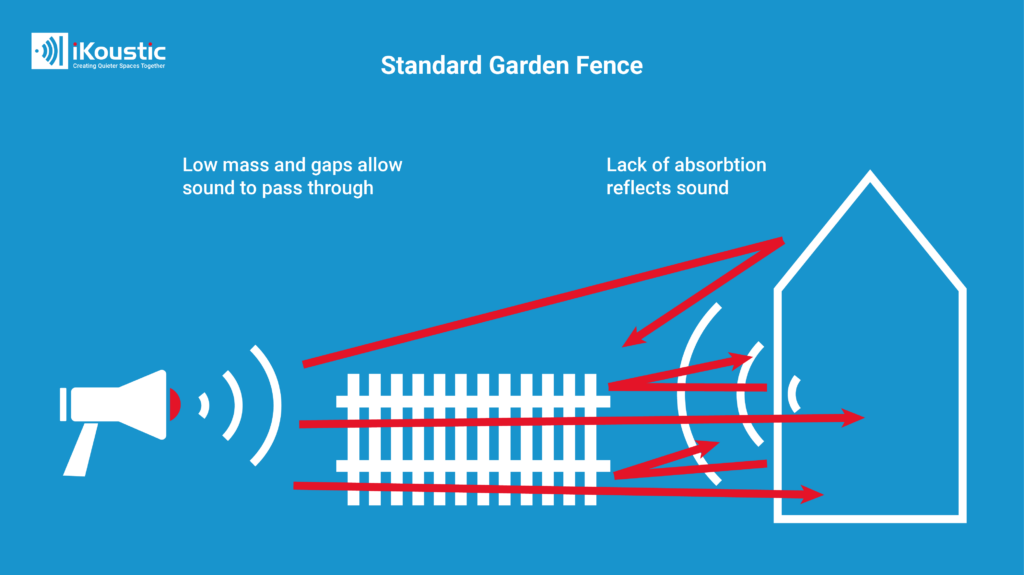
Without a high mass material (which can be expressed as kg/m2), soundwaves are able to pass through the wood fence and gaps easily. Noises from your own garden will also bounce off the fence and create even more noise outside.
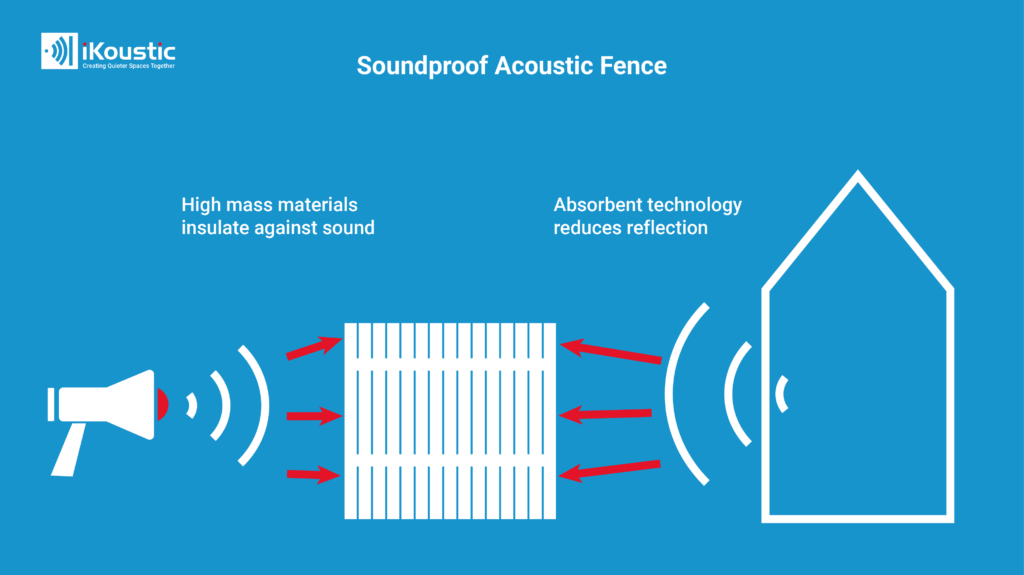
To create a soundproof garden fence that really works, we need to add mass and create a tight seal. Adding mass is the best way to soundproof a space and will even work outside. High mass soundproofing materials reduce the transmission of sound through the object and reflect the noise away. The higher the mass, the better the soundproofing fence will be! Meanwhile, high absorption soundproofing materials take the sound energy and convert it to heat.
| Fence Type | Weight per Meter Square |
|---|---|
| Standard Timber Fence | 4kg/m2 |
| Basic Acoustic Fence | 10kg/m2 |
| Noistop Acoustic Fence | 190kg/m3 (11.4-18.7 kg/m2) |
We must also add seal to the soundproofing qualities of a fence. A tight seal, quite literally, plugs up holes and prevents sound passing through. Standard timber fences have many gaps and holes which allow noise to get into your garden easily. The sign of a good acoustic fence, is that it will fit together snugly when installed in your garden, with not gaps between the fence panels.
What is better, a wood or a metal soundproof fence?
The problem with wood soundproof fences, is that wood is not very effective at insulating against sound. Whereas, metal reflects the sound and pushes it away from your garden. For example, road noise gets reflected back to the road, reducing the noise entering your garden. Insulation against sound is the first barrier to noise and reduces the amount of sound that will need to be absorbed by other materials in the soundproof fence.
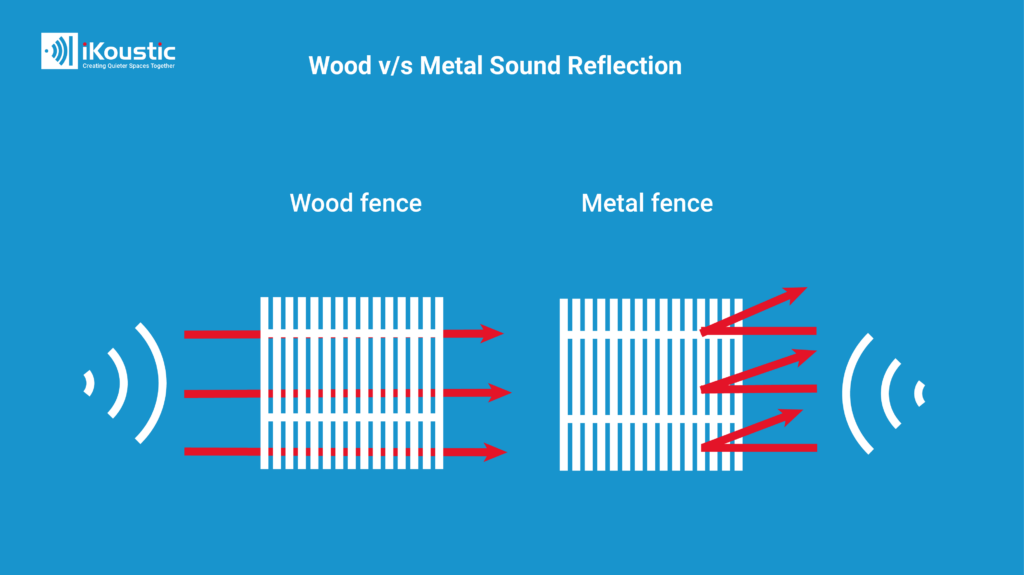
However, metal fences will not absorb sound well. When sound hits metal it is reflected, which is great, but can also reverb along the structure, transmitting the sound like an amplifier. Timber fence panels, however, will not amplify the sound in this way, as wood is naturally absorbent. That said, wood will allow more soundwaves to transmit through it, instead of reflecting them, meaning a wooden fence will require high absorbent insulation to be effective. This usually takes the form of more wood panels layered together.
For a metal soundproof fence to be effective at reflecting noise and absorbing it, we need to add extra technology.
How does a metal soundproof fence work?
A metal soundproof fence uses the reflective qualities of metal to push away as much sound as possible and the cavity is filled with insulation. The high mass of the metal reduces the transmission of sound through the barrier and the absorbent insulation reduces frequencies that sneak through reaching your garden.
This makes a metal soundproof fence, with insulation, the best way to soundproof your garden; while a wooden fence is very absorbent, the mass of wood is much lower than metal and hence it will not reflect sound as effectively as a metal soundproof fence.
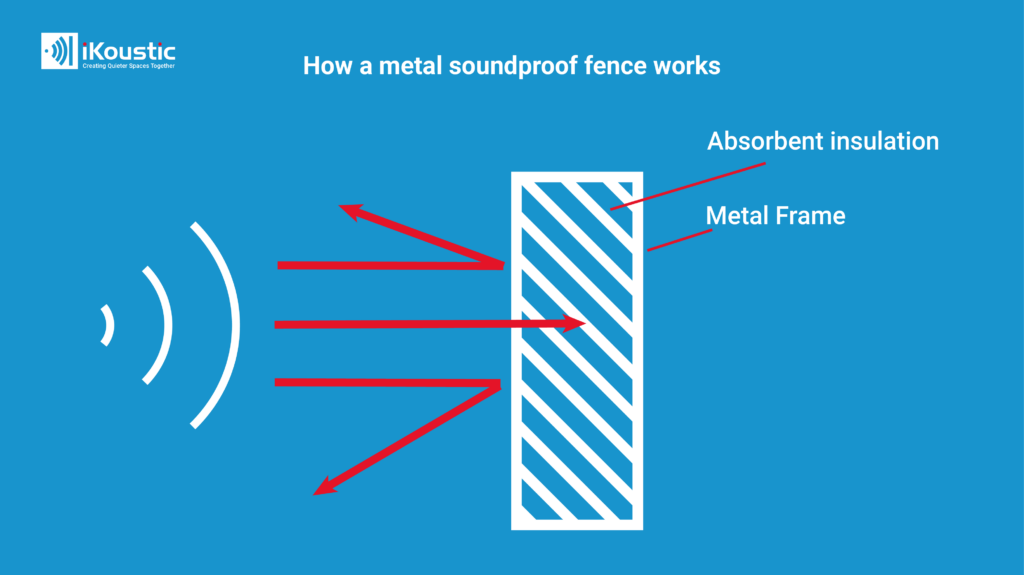
Can I soundproof my garden with noise reducing fence panels?
Yes you can! Installing a noise reduction fence correctly can transform your garden into a quiet and relaxing place to enjoy. As a rule of thumb, you’ll install the fence as close to the source of the noise as possible, i.e, your noisy neighbors, a road, or, an Air Source Heat Pump. The next rule for installing a soundproof fence is to ensure it blocks the line of sight to the source of the noise.
So, if you are erecting a fence next to a road, you’ll want to make sure you cannot see the cars and vans from your garden. Likewise, a soundproof fence to block out noisy neighbors will work is you can’t see them in their garden after it’s up. If you are looking to install a soundproof garden fence in the UK, you’ll need to be mindful of the restrictions that apply to the height.
For a street facing fence, unless you apply for planning permission it can be a maximum of 1 meter tall and for any other fence, such as your back garden, it can be as tall as 2 meters. If you are in an area of outstanding natural beauty, it’s best to check with your local authorities as to how high your garden fence can be, even without planning permission.
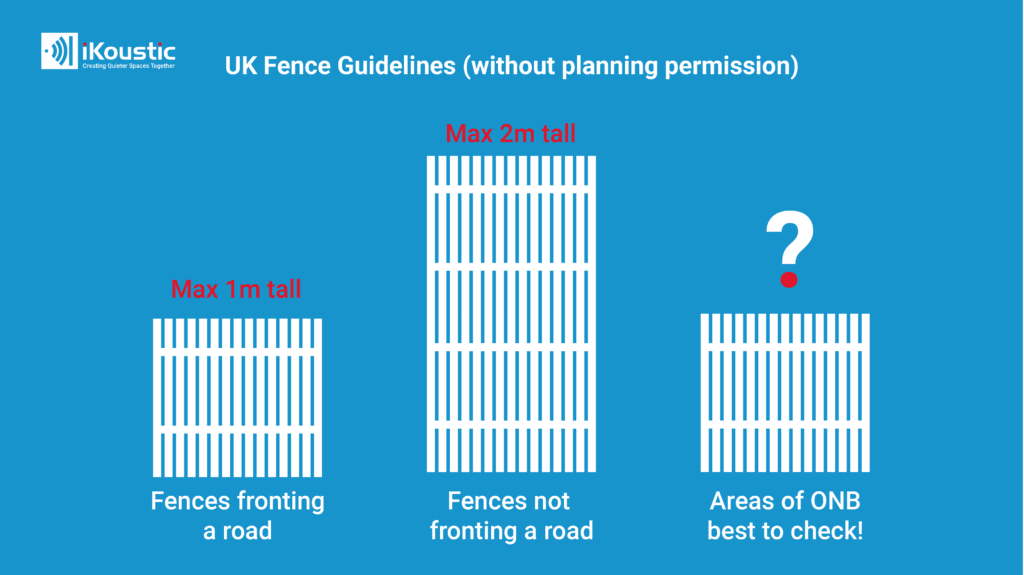
Can I soundproof my garden fence?
Trying to soundproof an existing garden fence is impractical for several reasons. As we know, mass and seal are key to creating an acoustic fence that actually works. If you were to add the necessary mass to a standard timber fence, it may not be able to support the weight and become unsafe or collapse.
You would also need to add more absorbent material to the garden fence, such as insulation, to reduce the transmission of sound. Insulation is usually added to a cavity, so you would also need to make your fence double skinned, (basically add another fence in front of your current fence with a gap between them). This would be very costly and you would be likely to create maintenance issues, especially is the cavity cannot breathe as it would grow mold.
Lastly, ordinary garden timber fences are riddled with holes and gaps that, ideally, should be plugged up. The whole process would be time consuming, expensive and without good structural integrity, could collapse. It is much better to invest in a purpose-made, acoustic tested soundproof garden fence solution that really works!
What is the best soundproof fence?
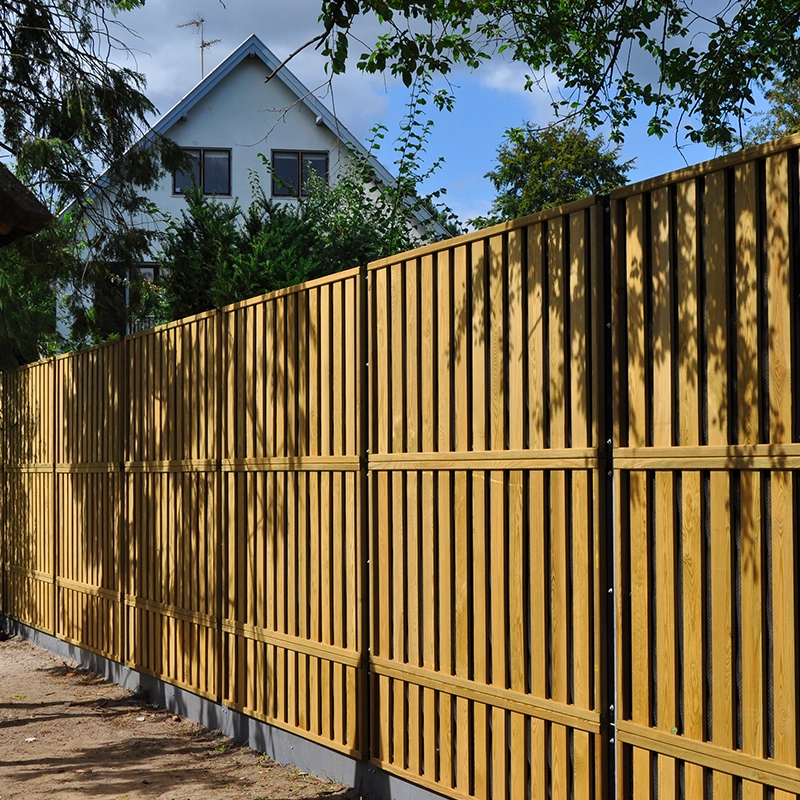
There are a multitude of soundproof fences available, specifically aimed at gardens, from reflective to absorbent and even fences that do both. Using the right tool for the right job is key – especially in urban residential uses with a lot of reflective surfaces, a purely reflective fence will not usually suffice, as noise will be bounced back around rather than attenuated.
Noistop both reflects and absorbs sound, making it ideal for all soundproof fencing applications. Form isn’t restricted by function either, as unlike alternative options, Noistop offers the option of adding decorative wooden cladding (seen above), to the face of the panels, or even using climbing plants to grow a living wall feature (or a combination of the two!).
Do soundproof fences need maintenance?
Maintaining a soundproof garden fence is another job you could do without! A completely timber soundproof fence would need some maintenance, like any garden timber. However, a totally wood acoustic fence should be treated with care as the onset of rot, mildew or nesting could compromise structural integrity over time.
Unlike traditional timber fences, Noistop soundproof fence panels require absolutely no maintenance – available in galvanised or powder coated steel, the exterior of the panels is extremely weather resistant. The Rockwool mineral wool core is inherently water resistant, while also being breathable preventing mould or mildew formation. All Noistop fence panels have an expected 30 year service life.
The decorative wooden cladding may need occasional maintenance, but these are not a structure feature and are easy to access. This cladding comes treated to further increase its water resistance, making it highly suitable for year-round outdoor use in any weather.
Can anyone install a soundproof fence?
A good soundproof garden fence will be heavy, (remember that we need high mass!), so it’s worth making sure you can access installation guidance before you buy your fence panels. A Noistop soundproof fence is installed in much the same way a conventional fence is, albeit with a few differences. To ensure optimal results, a good seal is required both under the fence and between panels. We can provide installation guidance, and can also recommend/provide installation services to make sure you get the best results.
Can a soundproof fence stop road noise?
Noistop soundproof fences were designed specifically with tackling road noise pollution. As of a 2006 noise map carried out by the UK government, it was estimated that 7.4 million people in large cities were living with traffic sound levels greater than or equal to 55 dB and 135,000 people experience noise, greater then or equal to, 75dB! The need for an effective soundproof fence couldn’t be easier to see – or hear, perhaps.
To effectively reduce road noise there are a few simple steps to take. One of the golden rules of soundproofing is to address the noise as close to the source as possible, so by placing the fence around the perimeter of your property, it is possible to create not only a quiet home but also quieter outdoor spaces too. This is a great option if you aren’t able to add any soundproofing systems to the structure of your home itself, and if you are, it’s a great complimentary system that will combine to produce the most effective soundproofing results.
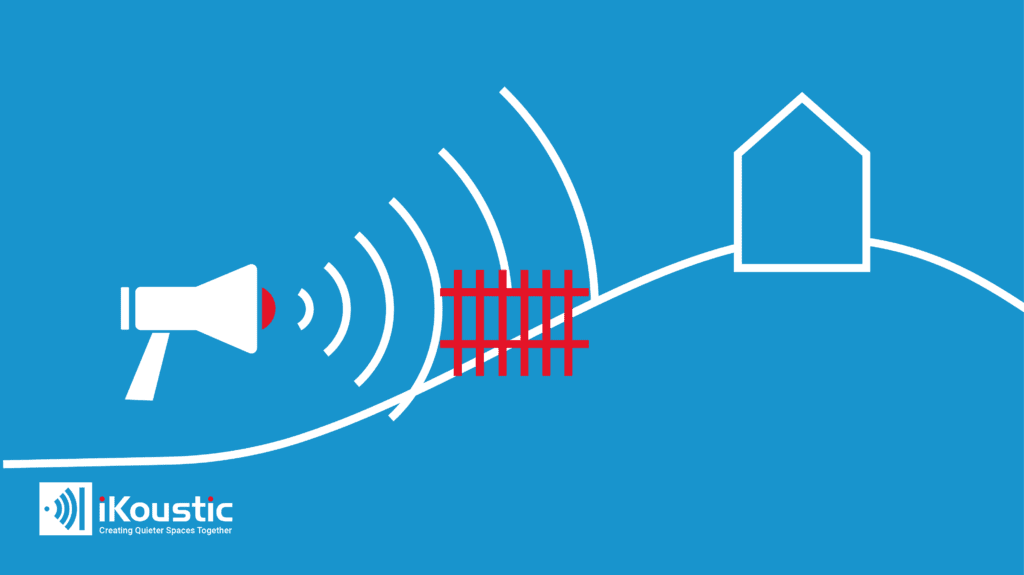
Next, as mentioned before, you should keep to the mantra of ‘out of sight, out of mind’. Whatever the source of your noise, you should aim to build a fence high enough that you can no longer see the source. So, if your house is on a hill and the road is at the bottom, you may want to put your soundproof fence closer to you, than the source, or else it won’t be tall enough to hide the traffic, and therefor, the soundwaves.








